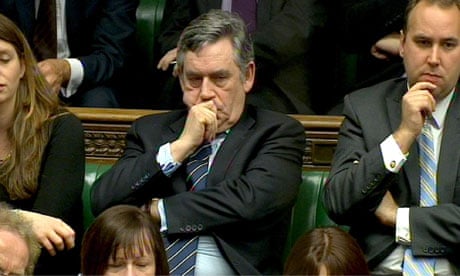No animal in the political jungle is more awful in its misery than an ex-prime minister. With the blood of past battle still congealed on its back, it howls through the haunts of old, reeking of stale breath and stale headlines, a putrefying hulk of resentment, hopelessness and revenge. It grabs friend and foe alike by the neck and cries: "Fools, the lot of you. I was right all along. Now look at the mess you have made."
Gordon Brown rose in the Commons debate on Wednesday and caused a buzz of excitement. Someone had left the cage door open and the beast was loose. Was the man who had bestrode the exchanges for a decade about to render his account on the deficit, the credit crunch, the Afghan war or his views on Tony Blair?
The answer was no. The issue that roused those mighty haunches from the benches was whether Brown's phone had been tapped. A man who had inexplicably paid court to the Murdoch press, attended Rebekah Brooks's wedding and even organised her birthday now accused her of "law-breaking on an industrial scale". The Sun has emphatically denied it used illegal methods to gain medical details of Brown's baby, but Brown knew he was on the side of angels and wanted no excuses. He was incandescent at the cabinet secretary for denying him a full judicial inquiry into his outrage.
There is no known way of retiring from the highest power with dignity. Every nation handles its statesmen in retirement differently. Kindly dictatorships shoot them or send them into exile. Some democracies bury them in pompous thinktanks with pompous titles. America declares its ex-presidents instant history and gives them foundations, staffs, limousines and memorial libraries.
Britain has never worked out what to do, because prime ministers were assumed to have country estates to which to retreat. The House of Lords is a happy retirement home, where ageing statesmen can still sniff the air and touch the hem of power, with a modest pension and a memoir advance.
But there is no way of handling the rage. Since the second world war, only Attlee, Churchill, Douglas-Home and Wilson can be said to have left office in relatively good order. Eden and Macmillan left sick. Heath, Major and Blair left afflicted by failure. Thatcher and Brown left in a maelstrom of skulduggery and treason.
The closest to perfection was Alec Douglas-Home, who led his party to a creditable defeat in 1964, and then returned in glory to a distinguished period at the Foreign Office in 1970. A Scots grandee, he was once heard at Pratt's, the London club, chatting about what to do with ex-prime ministers, having apparently forgotten he was one.
Douglas-Home appears to have been immune to what David Owen – in his study of leadership pathology, In Sickness and in Power – called the "hubris syndrome". Analysing the psychological impact of power on a leader's personality, Owen pointed out that these people, with huge doses of daily adrenaline, are in a perpetual state of post-traumatic stress disorder. The public presentation of men such as George Bush and Tony Blair might be that "of affable guys who can be trusted". Yet their inner hubris was "a great menace to the quality of leadership and the proper government of the world".
The unnaturalness of a senior politician's life, the lack of normal relaxants (other than alcohol), and the aloofness from family and friends, creates a disorder of which medical science is largely ignorant. As Owen points out, this omission is a serious matter that surely merits as much study as does ordinary illness.
To the end, Macmillan and Callaghan demonstrated the well-known feature of the syndrome, the fantasy that they would one day be "called back" to save their countries. Heath was sure Margaret Thatcher would make such a mess that he would return to power. Indeed, on the eve of the 1979 election Thatcher's aides were so convinced she would lose that they asked Heath to share her last pre-election party broadcast, reducing her to a fury of frustration and tears.
Throughout her premiership Thatcher had to put up with Heath sitting just below the gangplank in a permanent state of sullen resentment. Making the best of it, she said that he was an ever-present warning of a mistake she should never repeat. When Heath eventually published his memoirs, he waddled to the podium at the Millbank reception, gazed over the audience and begun, with the merest twitch of a smile: "The sulk is over…" It was not.
But then Thatcher gave as good as she got. Soon after her fall she travelled to open a hotel in Warsaw, lecturing an adulatory audience on the wonders of being Polish. She went into complete orbit and was even told she should run as Poland's president, a suggestion that left her glowing with ambition. Such moments of recalled glory were rare, and she soon sank into resentment at her overthrow, muttering about treachery and "never having lost an election". Though Major had always served her with total loyalty, she was dreadful towards him, flirting with Blair in 1997 when he blessed her as "a radical not a Tory". She even assured the nation just before the poll that Blair "is a man who won't let Britain down".
Probably it is just that prime ministers – like most people – revert to some former identity in retirement. Douglas-Home became a courteous Borders grandee, whose addiction to field sports ensured he would never stray into commenting on his successors. Callaghan took to his Sussex farm, regretting that as an old sailor, "I never had a Falklands war to fight".
Major never lost his thin skin and sensitivity to criticism. I was sitting one balmy day watching cricket at Lords when a figure slid into the seat beside me, his identity shielded by the sun. "You were quite wrong about me," the man said nervously, "quite wrong." It was John Major still fuming about something I had written, and long forgotten, years before. Major has at least settled into a profitable retirement doing what he does best, which is talk.
Blair's life since leaving office has appeared to mimic the film, The Ghost. It showed him moving between cold, shoreline villas devoid of books, staffed by lonely secretaries and faceless men with earpieces. Everywhere was a numbing security and silence. The Blair character's retinue of cosmeticians and historians seemed to rebuild his past as often as they did his face. Life after political death was for him a world cruise of pseudo-peacemaking, with a suite and a secretary in every trouble spot. Blair is today like Henry II, still doing penance for the death of Becket.
Hubris syndrome is probably incurable, the occupational disease of power. But it must have its uses. Ex-prime ministers should always have a place in the upper house, there to dispense such wisdom as is sometimes the product of experience. I would gladly hear Blair and Brown reflect, under due cross-examination, on their past deeds. The one duty owed by youth to age is sometimes to listen.

